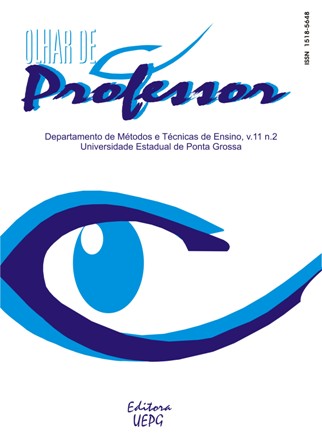AULAS PARA TURMAS-PILOTO: INTERFACES EM DIDÁTICA E ESTÁGIO SUPERVISIONADO EM BIOLOGIA (LESSONS TO PILOT CLASSES: INTERFACES BETWEEN DIDATICS AND SUPERVISED TRAINING IN BIOLOGY) - Doi: http://dx.doi.org/10.5212/OlharProfr.v.11i2.295311
Conteúdo do artigo principal
Resumo
O presente relato de pesquisa apresenta o desenvolvimento de um trabalho que, por meio de aulas para turmas-piloto, proporcionou um contato de acadêmicos com alunos antes de se adentrar no campo de estágio. A pesquisa descrita foi realizada no ano de 2005, com 13 acadêmicos do terceiro ano do curso de Ciências Biológicas da Universidade Estadual de Ponta Grossa (UEPG), no Paraná. Os principais objetivos foram: avaliar o impacto resultante da vivência das aulas para turmas-piloto na formação docente e verificar se alguns dos encaminhamentos teórico-metodológicos trabalhados nas disciplinas de Didática e Estágio Supervisionado em Biologia revelavam-se nos procedimentos dos acadêmicos durante a realização da prática em questão. Para tanto, utilizou-se a abordagem de pesquisa qualitativa, de natureza interpretativa. A metodologia abrangeu três momentos para registro e análise do material empírico, obtido através do trabalho com a tematização da prática: ação, reflexão, ação. Os principais resultados apontam para uma melhora significativa nas aulas ministradas pelos acadêmicos após a reflexão sobre a prática, pois possibilitaram aos licenciandos a análise do trabalho docente frente à classe, permitindo o aprimoramento das práticas de ensino.
Palavras-Chave: Estágio supervisionado. Didática. Formação de professores.
This research report presents the development of a work which provided this kind of contact before the students´ training by teaching lessons to pilot classes. The research was developed in 2005 by 13 trainees from the 3º serie of Biologycal Sciences course at Universidade Estadual de Ponta Grossa (UEPG) - State of Paraná. The main objectives were: to evaluate the impact for academic students formation as a result of the lessons taught to pilot classes and verify if some theoretical and methodologic procedures worked during Didactics and Biology Teaching Practice lessons have appeared during the mentioned practice. For this purpose a qualitative approach research was used, through an interpretative nature. The methodology for registration and analysis of the empirical material collected was divided into three moments: action, reflexion, action. The results pointed to significative improvement in lessons taught by students after the reflexion about their practice because it permited an analysis of the teaching work in front of the classes, allowing teaching practices improvement.
Keywords: Supervised training. Didactics. Teachers formation.
Downloads
Detalhes do artigo
Autores que publicam nesta revista concordam com os seguintes termos:
a) Os autores mantêm os direitos autorais e concedem à revista o direito de primeira publicação, com o trabalho simultaneamente licenciado sob a Creative Commons Attribution License Atribuição 4.0 Internacional (CC BY 4.0) que permite o compartilhamento do trabalho com reconhecimento da sua autoria e publicação inicial nesta revista.
b) Os autores são autorizados a assinarem contratos adicionais, separadamente, para distribuição não exclusiva da versão publicada nesta revista (por exemplo, em repositórios institucionais ou capítulos de livros), com reconhecimento da sua autoria e publicação inicial nesta revista).
c) Os autores são estimulados a publicar e distribuir a versão onlline do artigo (por exemplo, em repositórios institucionais ou em sua página pessoal), considerando que isso pode gerar alterações produtivas, bem como aumentar o impacto e as citações do artigo publicado.
d) Esta revista proporciona acesso público a todo o seu conteúdo, uma vez que isso permite uma maior visibilidade e alcance dos artigos e resenhas publicados. Para maiores informações sobre esta abordagem, visite Public Knowledge Project, projeto que desenvolveu este sistema para melhorar a qualidade acadêmica e pública da pesquisa, distribuindo o OJS assim como outros softwares de apoio ao sistema de publicação de acesso público a fontes acadêmicas.
e) Os nomes e endereços de e-mail neste site serão usados exclusivamente para os propósitos da revista, não estando disponíveis para outros fins.
______________

Este obra está licenciado com uma Licença Creative Commons Atribuição 4.0 Internacional.





